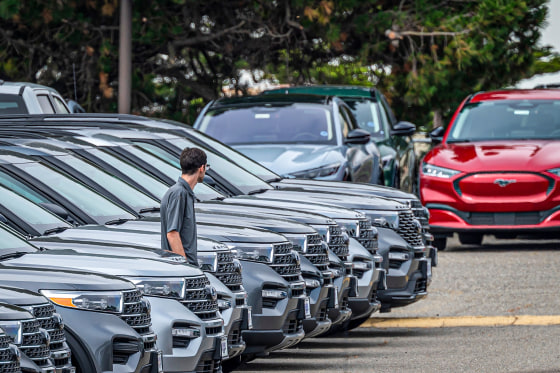
DETROIT Industry analysts predict that next year’s new car sales in the United States will reach their greatest level since 2019, driven by improved affordability and reduced financing rates.
Cox Automotive anticipates 16.3 million new light-duty vehicle sales in 2025, which is marginally more than S&P Global Mobility and Edmunds’ projections of 16.2 million sales in the same year. These sales would be the biggest since about 17 million in 2019 and would surpass projections of 15.9 million to 16 million this year.
That would correspond to a 2.5% or less predicted increase in new automobile and truck sales. Automakers’ incentives and discounts, relaxing financing and loan rates, and the ongoing normalization of car inventories are anticipated to be the main drivers of the increase.
Jessica Caldwell, head of insights at Edmunds, stated in a release on Tuesday that although consumers are still feeling the pinch, the market has become a little more welcoming for car buyers than it was at the beginning of the year.
Entry-level and less costly automobiles are predicted to be one of the biggest growth markets. Since the coronavirus pandemic, the business has had to contend with years of higher prices and decreased inventory.
According to Edmunds,For new cars, the average transaction price in 2024 was $47,465—a decline of 0.8% from $47,851 in 2023 and a 27.2% increase from $37,310 in 2019.
EVs
Analysts predict that electrified vehicles, such as hybrid, plug-in hybrid, and all-electric models, will continue to be a growing area.
According to Cox, the number of all-electric vehicles sold in the United States is expected to reach 1.3 million in 2024, setting yet another record. That would represent about 8% of the market, which is higher than the 7.6% it had last year but less than the 10% predicted earlier this year.
This is in spite of a predicted year-over-year drop in sales of Tesla, the leading EV in the US, for the first time since 2014.
Tesla, Hyundai Motor Group, and General Motors are the top three manufacturers; at the brand level, GM has seen the biggest gain in market share, at 2.7% annually. Stephanie Valdez Streaty, director of industry analytics at Cox, stated on Tuesday that the Model Y and Model 3 remain the top two models, despite Tesla’s market share falling below 50%. Together, a number of rival models are reducing Tesla’s market share.
In 2025, Cox predicts that about 25% of new car sales will be electric, with over 10% of those sales going to all-electric cars.
Valdez Streaty and others warned that if federal consumer subsidies of up to $7,500 for buying EVs are eliminated—something the Trump administration has threatened to do—EV sales may suffer.
‘Radical disruption’?
Analysts cautioned that new U.S. car sales may be impacted by regulatory uncertainties before to President-elect Donald Trump’s inauguration. Most significantly, the manufacture of automobiles in Canada and Mexico may be impacted by Trump’s tariff threats.
The U.S. new car industry would be severely disrupted by tariffs on those nations, which Trump has suggested may reach 25%, according to Jonathan Smoke, chief economist at Cox Automotive.
We are aware that policy changes may take unexpected turns, but we are making some important assumptions, such as that most of those changes will take time and will likely push demand forward before they are implemented, Smoke stated during a virtual briefing on Tuesday. Regarding tariffs in particular, we are not assuming that significant additional duties will be imposed.
Wall Street experts predict that higher incentive rates and a predicted drop in pricing will make the anticipated increase in U.S. new car sales next year counterintuitive for certain automakers’ earnings.
In an investor note released on Monday, Colin Langan, an analyst at Wells Fargo, noted that there are still indications that pricing is unsustainable. He cited factors such as growing inventories, increased incentives, declining dealer profitability per vehicle, and generally diminished pricing power for manufacturers.
Although growth has moderated, prices are still close to record highs, which is excellent for consumers but bad for automakers.
More from CNBC:
-
Merck to develop weight loss pill from Chinese drugmaker in up to $2 billion licensing deal
-
Why the Dow is in such a historic funk and how concerned you should be
-
Trump s pick to lead NASA made a big bet on crypto while going to space on the side
Note: Every piece of content is rigorously reviewed by our team of experienced writers and editors to ensure its accuracy. Our writers use credible sources and adhere to strict fact-checking protocols to verify all claims and data before publication. If an error is identified, we promptly correct it and strive for transparency in all updates, feel free to reach out to us via email. We appreciate your trust and support!
